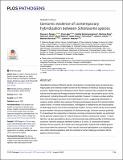Genomic evidence of contemporary hybridization between Schistosoma species
Abstract
Hybridization between different species of parasites is increasingly being recognised as a major public and veterinary health concern at the interface of infectious diseases biology, evolution, epidemiology and ultimately control. Recent research has revealed that viable hybrids and introgressed lineages between Schistosoma spp. are prevalent across Africa and beyond, including those with zoonotic potential. However, it remains unclear whether these hybrid lineages represent recent hybridization events, suggesting hybridization is ongoing, and/or whether they represent introgressed lineages derived from ancient hybridization events. In human schistosomiasis, investigation is hampered by the inaccessibility of adult-stage worms due to their intravascular location, an issue which can be circumvented by post-mortem of livestock at abattoirs for Schistosoma spp. of known zoonotic potential. To characterise the composition of naturally-occurring schistosome hybrids, we performed whole-genome sequencing of 21 natural livestock infective schistosome isolates. To facilitate this, we also assembled a de novo chromosomal-scale draft assembly of Schistosoma curassoni. Genomic analyses identified isolates of S. bovis, S. curassoni and hybrids between the two species, all of which were early generation hybrids with multiple generations found within the same host. These results show that hybridization is an ongoing process within natural populations with the potential to further challenge elimination efforts against schistosomiasis.
Citation
Berger , D J , Léger , E , Sankaranarayanan , G , Sène , M , Diouf , N D , Rabone , M , Emery , A , Allan , F , Cotton , J A , Berriman , M , Webster , J P & Zamanian , M (ed.) 2022 , ' Genomic evidence of contemporary hybridization between Schistosoma species ' , PLoS Pathogens , vol. 18 , no. 8 , e1010706 . https://doi.org/10.1371/journal.ppat.1010706
Publication
PLoS Pathogens
Status
Peer reviewed
ISSN
1553-7366Type
Journal article
Description
This work was supported by the Wellcome Trust (grant number 206194); the Biotechnology and Biological Sciences Research Council, the Department for International Development, the Economic & Social Research Council, the Medical Research Council, the Natural Environment Research Council and the Defence Science & Technology Laboratory, under the Zoonoses and Emerging Livestock Systems (ZELS) programme (grant number BB/L018985/1 to JPW and MS and grant number BB/S013822/1 to JPW, MS and NDD). FA, AE and MR received funding from the Wellcome Trust (grant number 104958/Z/14/Z).Collections
Items in the St Andrews Research Repository are protected by copyright, with all rights reserved, unless otherwise indicated.

